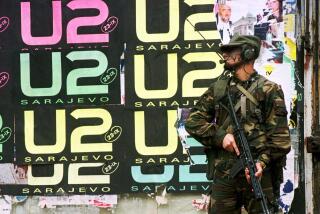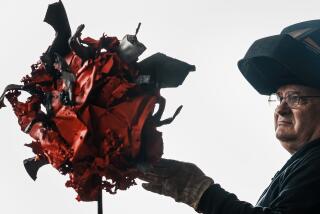Novi Sad’s Agricultural Fair Goes Through Fallow Patch
- Share via
NOVI SAD, Yugoslavia — The show went on Wednesday at the 66th annual Novi Sad Agricultural Fair, but the event that in the past was Yugoslavia’s largest international trade convention seemed more a portrait of a defeated nation’s isolation.
You know you are in trouble, for example, when you take comfort in displays of Ukrainian gas cans, Hungarian broiler chickens and Slovenian fruit and nuts.
The Czechs came with food additives. The Bulgarians offered brandy. And most of Yugoslavia’s top companies also showed up--although many had their factories demolished by NATO bombers.
Such is the aftermath of war in this once-booming crossroads in northern Yugoslavia, where Asian and European traders have swapped goods for centuries. Organizers acknowledged Wednesday that this year’s weeklong event is pretty much a take-what-you-can-get affair.
Shunned after a devastating air war carried out in part by European neighbors, suffering under economic sanctions and enduring the occupation of its southern region by foreign troops--including soldiers of its two largest trading partners, Italy and Germany--Yugoslavia is pretty much open to all offers these days.
In fact, Novi Sad Mayor Stevan Vrbaski couldn’t make it to the trade fair Wednesday. He was in Ukraine, shopping for ferryboats to help tens of thousands of his city’s commuters find a way across the Danube River after NATO bombers severed Novi Sad in two by destroying key bridges.
Deputy Mayor Predrag Filipov was in meetings with Romanian engineers, trying to find a way to repair the city’s bombed-out power plant in time for its 300,000 residents to make it through the winter.
And then there’s the matter of the 13 million gallons of fuel oil Novi Sad needs annually to survive, after NATO bombed all of the city’s refineries and storage tanks in a series of attacks that showered Novi Sad with acid rain for days.
“If President Clinton truly wants to help democracy in Yugoslavia, he need only send us a few thousand gallons of fuel oil,” Filipov said after meeting with the Romanians.
The suggestion to a U.S. president who was instrumental in bombing his city back a century or two wasn’t as strange as it seems.
City’s Top Officials Are Anti-Milosevic
Both Novi Sad’s mayor and deputy mayor are members of pro-democracy parties that are fiercely opposed to Yugoslav President Slobodan Milosevic. And the White House now is considering direct aid to opposition-ruled cities and towns throughout Yugoslavia as part of an array of overt and covert operations to encourage Milosevic’s departure from power.
Already, Filipov said, Novi Sad has received humanitarian aid from German sister cities. But with his government isolated within Yugoslavia by its opposition to the federal government, which determines the city’s revenues and budget, Filipov harbors little hope of immediate relief.
“We are isolated, that’s a fact,” he said. “The people of Novi Sad now are thinking only of their most basic existence.”
The scene beside what was once the Varadin Bridge--demolished by North Atlantic Treaty Organization warplanes along with two other spans that linked east and west Novi Sad--is a poignant metaphor. Every 15 minutes, a rusted flatbed barge packed with 600 standing commuters is pushed by a tugboat from one bank to the other across the muddy half-mile of Danube.
And hours pass without a commercial vessel moving on what was once a major trade route. Army officers said the riverbed is littered with twisted concrete and metal debris from the bridges and with unexploded bombs.
But it was at the Novi Sad Agricultural Fair, which continues through Sunday, that the gathering’s executive director, Miroslav Bozin, said the city’s postwar situation can be measured in numbers--from exhibition booths to heads of cattle.
Before Wars, Fair Attracted 80 Countries
In the heyday of the former Yugoslav federation, before a decade of war turned one after another of its constituent republics into separate nations, the fair boasted booths from as many as 80 countries. Last year, 40 nations were represented, he said. This year, there are just 10, which also include Austria, Italy, Germany, Slovakia and India.
“Because of the whole situation, many exhibitors said they would come to auto fair in the fall instead,” a hopeful Bozin said of a September exhibition that will include farm vehicles and machinery. “Besides, everything had to be prepared in just 15 days. We started the day the war was over. So domestic and foreign companies didn’t have enough time to get their goods here.
“We know we’re an isolated nation, but we think the [agricultural] fair is the place where all the economies of the world still must gather.”
Bozin explained that the fair even drew Yugoslav companies whose factories were damaged by NATO bombs. Zastava, whose vehicle-assembly plant in Kragujevac was obliterated, attended, he said, because “they still have some trucks and cars to sell that haven’t been bombed.”
In the center of the 700-acre fairgrounds stood an outpost that fueled his hopes. It was a small, wooden house surrounded by tractors and harvesters under a banner that read “John Deere.”
The sole U.S. company represented at the fair this year has, in fact, had a presence each year since 1995, explained Yugoslav sales manager Dusan Mandaric. Through those years, he said, Deere has sold about 2,000 tractors here. But for Mandaric, whose father has been general manager of the Deere-affiliated Yugoslav firm, Jugodir, for two decades, this easily was the strangest of years.
The 27-year-old Serb said he is a reservist and served as an officer in the Yugoslav army’s special forces throughout the 11-week NATO air war. His post: Kosovo.
“This was a horrible war, and there are many things I still do not understand--especially from the Americans,” he said, having traded his uniform for a tailored suit just in time for the fair.
“But why shouldn’t I be here representing John Deere today? For me, the company is like a country. My first toys were little John Deere tractors. My first trips were to see the factories in the American Midwest. The war is over now. And now, it’s time to forget.”
More to Read
Sign up for Essential California
The most important California stories and recommendations in your inbox every morning.
You may occasionally receive promotional content from the Los Angeles Times.













